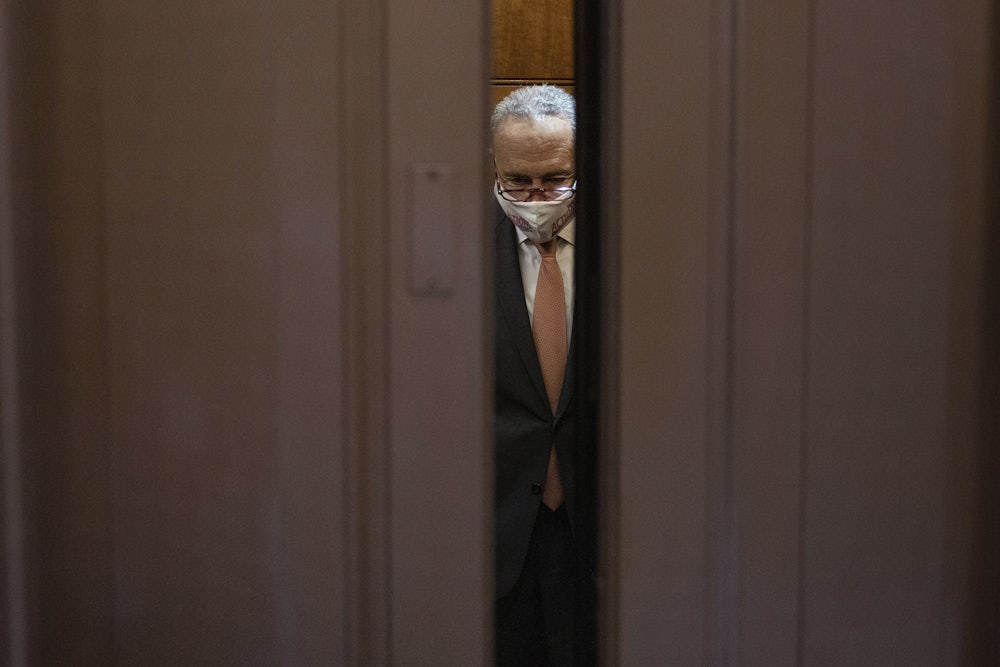Joe Biden resorted to one of his grandfather’s stock phrases when he was asked by reporters Monday morning whether an agreement would finally be forged on his ambitious spending plan this week. As he was about to board Air Force One, the president replied, “With the grace of God and the goodwill of the neighbors.”
Although Biden did not mean it in precisely these terms, the Democrats are only holding their Senate majority “with the grace of God.”
There is no need to consult actuarial tables to understand how fragile a zero-votes-to-spare Senate majority can be in the midst of a pandemic. All that is required is to brush up on the history of the Senate during the first two years of Dwight Eisenhower’s presidency.
The 1952 Eisenhower landslide created a Senate balanced on a knife edge, with the Republicans holding a 48–47 majority aided by an independent (Oregon’s Wayne Morse) who caucused with the GOP. During the next two years, a stunning nine senators died in office, including Majority Leader Robert Taft. After his death in 1953, The New York Times described it as a “Senate controlled by the Republicans more out of courtesy than fact.”
Senate Democrats, led by their newly chosen Minority Leader Lyndon Johnson, never pressed their advantage, even though Morse would eventually become a fiercely liberal Democrat. As Robert Caro makes clear in the Master of the Senate volume of his majestic series of LBJ biographies, Johnson believed that the best political strategy was to work with Eisenhower rather than oppose him.
If the Democrats lose a Senate seat before the 2022 midterms, Mitch McConnell is unlikely to be as accommodating.
Even though governors can appoint senators to fill vacancies temporarily, that arrangement should provide little comfort for the Democrats. Fifteen Democratic senators represent states with Republican governors. And seven of those senators (Bernie Sanders, Patrick Leahy, Elizabeth Warren, Ed Markey, Jeanne Shaheen, Ben Cardin, and Joe Manchin) are over the age of 70.
Just last week, Mother Jones broke the story that Manchin had been contemplating leaving the Democratic Party to become an independent. After initial angry denials, Manchin confirmed the rumors, although he insisted that he would, in any case, continue to caucus with the Democrats. And while Kyrsten Sinema is significantly to Manchin’s left on issues such as climate and abortion, it is possible to imagine her abandoning the Democrats out of pique over the rage that has been directed at her by party activists.
There is modern precedent for a majority-altering Senate party switch. In 2001, with the Senate divided 50–50 as it is now, Vermont’s Jim Jeffords, a true moderate Republican, abandoned the GOP to caucus with the Democrats and make Tom Daschle majority leader.
The real threat to Senate Democrats lies in the unalterable realities of human mortality. The point is not to be ghoulish but realistic. Container ships from China have been moving faster than congressional negotiations over the Biden reconciliation package. Manchin wrote a memo to Chuck Schumer at the end of July saying that he would not support a spending plan of more than $1.5 trillion. Only now—three months later—are Democrats finally adjusting to the reality that talk of $3.5 trillion in spending was little more than a left-wing air castle.
What makes this dilatory pace unfathomable is that Democrats know the disastrous implications of the loss of a single Senate seat in the midst of a legislative battle. In January 2010, Massachusetts Democrat Martha Coakley—running what may have been the worst major campaign of the twenty-first century—managed to lose the special election to fill the late Ted Kennedy’s Senate seat. That cost the Democrats a filibuster-proof Senate majority. As a result, the only way to pass the Affordable Care Act was for the House to rubber-stamp the flawed, already approved Senate version of the legislation.
What is strange is that the Democrats have been obsessed with human frailty in other political arenas. During the brief period when otherwise sensible people worried that Gavin Newsom could lose the California recall election, a major concern was that a GOP governor might get to appoint a successor to 87-year-old Dianne Feinstein.
Democrats are still reeling from the realization that Ruth Bader Ginsburg (whose Supreme Court seat is now filled by her antithesis, Amy Coney Barrett) should have retired rather than gambling that intellect and determination alone could defeat the Grim Reaper. That is why you could hear the audible wails from liberals when 83-year-old Stephen Breyer refused to retire at the end of the last Supreme Court term. The fear that McConnell—if he is again elevated to majority leader—would not allow Biden to fill a Supreme Court vacancy is as palpable as it is realistic.
Yet even now, as negotiations over the spending package take on a new urgency, the motivations for immediate action have little to do with the Democrats’ membrane-thin Senate majority. The biggest current concern is that failure to pass the $1 trillion infrastructure bill (which has become inextricably linked to reconciliation) might jeopardize Terry McAuliffe’s chances in the Virginia gubernatorial race. And Biden wants to highlight the environmental provisions in his spending plan as he heads to Sunday’s climate change summit in Glasgow.
Even if there is (knock on wood) a finalized deal on a spending figure and a legislative framework this week, the path for Congress to pass the Biden plan is arduous. Avoiding a Senate filibuster through the budgetary maneuver called reconciliation is tricky in the best of circumstances. At any point, a handful of Democrats in the House or a single senator can derail the legislation with some new nonnegotiable demand. Up to now, during this glacially slow process, both moderates and left-wingers have sometimes behaved as if they would rather risk the entire enterprise than compromise.
The Democrats have been lucky that they still hold their 50-votes-plus-Kamala-Harris majority, 10 months into the legislative session. But as congressional Democrats work out how to pay for Biden’s spending plan, they should remember that taxes are not the only thing famed for being certain.






